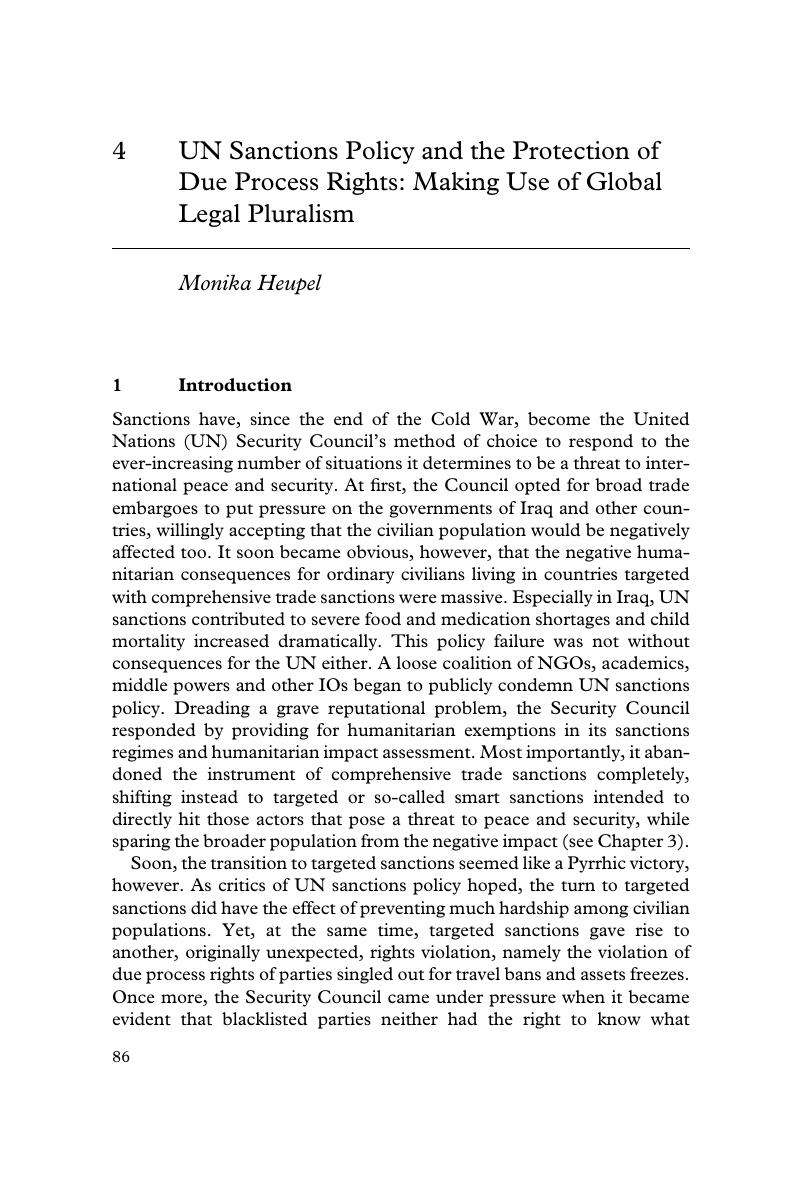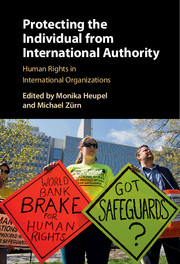Book contents
- Protecting the Individual from International Authority
- Protecting the Individual from International Authority
- Copyright page
- Contents
- Figures
- Tables
- Contributors
- Acknowledgements
- 1 Human Rights Protection in International Organizations: An Introduction
- 2 Conceptual Framework
- 3 UN Sanctions Policy and the Protection of Subsistence Rights: Fighting Off a Reputational Crisis
- 4 UN Sanctions Policy and the Protection of Due Process Rights: Making Use of Global Legal Pluralism
- 5 EU Sanctions Policy and the Protection of Subsistence Rights: Learning from the Early Mover
- 6 EU Sanctions Policy and the Protection of Due Process Rights: Judicial Lawmaking by the Court of Justice of the EU
- Notes on Chapters 3–6
- 7 UN Peacekeeping and the Protection of Bodily Integrity Rights: When Protectors Become Perpetrators
- 8 UN Peacekeeping and the Protection of Due Process Rights: Learning How to Protect the Rights of Detainees
- 9 NATO Peacekeeping and the Protection of Bodily Integrity Rights and the Right Not to Be Enslaved: Domestic Channels for NATO Reform
- 10 NATO Peacekeeping and the Protection of Due Process Rights: The OSCE and Council of Europe as Advocates for the Rights of Detainees
- Notes on Chapters 7–10
- 11 Human Rights Protection in World Bank Lending: Following the Lead of the US Congress
- 12 Human Rights Protection in IMF Lending: Organizational Inertia and the Limits of Like-Minded Institution-Building
- Notes on Chapters 11–12
- 13 The Rise of Human Rights Protection in International Organizations – Results and Theoretical Implications
- Book part
- Index
- References
4 - UN Sanctions Policy and the Protection of Due Process Rights: Making Use of Global Legal Pluralism
Published online by Cambridge University Press: 28 April 2017
- Protecting the Individual from International Authority
- Protecting the Individual from International Authority
- Copyright page
- Contents
- Figures
- Tables
- Contributors
- Acknowledgements
- 1 Human Rights Protection in International Organizations: An Introduction
- 2 Conceptual Framework
- 3 UN Sanctions Policy and the Protection of Subsistence Rights: Fighting Off a Reputational Crisis
- 4 UN Sanctions Policy and the Protection of Due Process Rights: Making Use of Global Legal Pluralism
- 5 EU Sanctions Policy and the Protection of Subsistence Rights: Learning from the Early Mover
- 6 EU Sanctions Policy and the Protection of Due Process Rights: Judicial Lawmaking by the Court of Justice of the EU
- Notes on Chapters 3–6
- 7 UN Peacekeeping and the Protection of Bodily Integrity Rights: When Protectors Become Perpetrators
- 8 UN Peacekeeping and the Protection of Due Process Rights: Learning How to Protect the Rights of Detainees
- 9 NATO Peacekeeping and the Protection of Bodily Integrity Rights and the Right Not to Be Enslaved: Domestic Channels for NATO Reform
- 10 NATO Peacekeeping and the Protection of Due Process Rights: The OSCE and Council of Europe as Advocates for the Rights of Detainees
- Notes on Chapters 7–10
- 11 Human Rights Protection in World Bank Lending: Following the Lead of the US Congress
- 12 Human Rights Protection in IMF Lending: Organizational Inertia and the Limits of Like-Minded Institution-Building
- Notes on Chapters 11–12
- 13 The Rise of Human Rights Protection in International Organizations – Results and Theoretical Implications
- Book part
- Index
- References
Summary

- Type
- Chapter
- Information
- Protecting the Individual from International AuthorityHuman Rights in International Organizations, pp. 86 - 110Publisher: Cambridge University PressPrint publication year: 2017
References
- 2
- Cited by



